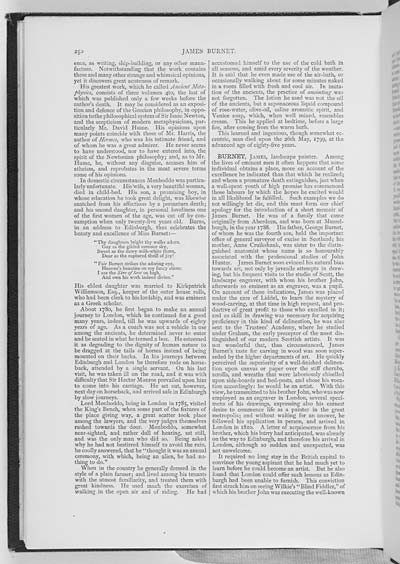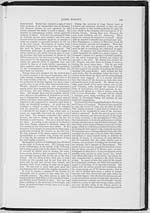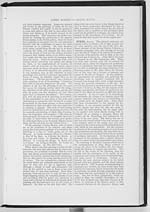250
ence, as writing, ship-building, or any other manu-
facture. Notwithstanding that the work contains
these and many other strange and whimsical opinions,
yet it discovers great acuteness of remark.
His greatest work, which he called Ancient Meta-
physics, consists of three volumes 4to, the last of
which was published only a few weeks before the
author's death. It may be considered as an exposi-
tion and defence of the Grecian philosophy, in oppo-
sition to the philosophical system of Sir Isaac Newton,
and the scepticism of modern metaphysicians, par-
ticularly Mr. David Hume. His opinions upon
many points coincide with those of Mr. Harris, the
author of Hermes, who was his intimate friend, and
of whom he was a great admirer. He never seems
to have understood, nor to have entered into, the
spirit of the Newtonian philosophy; and, as to Mr.
Hume, he, without any disguise, accuses him of
atheism, and reprobates in the most severe terms
some of his opinions.
In domestic circumstances Monboddo was particu-
larly unfortunate. His wife, a very beautiful woman,
died in child-bed. His son, a promising boy, in
whose education he took great delight, was likewise
snatched from his affections by a premature death;
and his second daughter, in personal loveliness one
of the first women of the age, was cut off by con-
sumption when only twenty-five years old. Burns,
in an address to Edinburgh, thus celebrates the
beauty and excellence of Miss Burnet:�
"Thy daughters bright thy walks adorn,
Gay as the gilded summer sky,
Sweet as the dewy milk-white thorn,
Dear as the raptured thrill of joy!
" Fair Burnet strikes the adoring eye,
Heaven's beauties on my fancy shine;
I see the Sire of love on high,
And own his work indeed divine."
His eldest daughter was married to Kirkpatrick
Williamson, Esq., keeper of the outer house rolls,
who had been clerk to his lordship, and was eminent
as a Greek scholar.
About 1780, he first began to make an annual
journey to London, which he continued for a good
many years, indeed, till he was upwards of eighty
years of age. As a coach was not a vehicle in use
among the ancients, he determined never to enter
and be seated in what he termed a box. He esteemed
it as degrading to the dignity of human nature to
be dragged at the tails of horses instead of being
mounted on their backs. In his journeys between
Edinburgh and London he therefore rode on horse-
back, attended by a single servant. On his last
visit, he was taken ill on the road, and it was with
difficulty that Sir Hector Monroe prevailed upon him
to come into his carriage. He set out, however,
next day on horseback, and arrived safe in Edinburgh
by slow journeys.
Lord Monboddo, being in London in 1785, visited
the King's Bench, when some part of the fixtures of
the place giving way, a great scatter took place
among the lawyers, and the very judges themselves
rushed towards the door. Monboddo, somewhat
near-sighted, and rather dull of hearing, sat still,
and was the only man who did so. Being asked
why he had not bestirred himself to avoid the ruin,
he coolly answered, that he "thought it was an annual
ceremony, with which, being an alien, he had no-
thing to do."
When in the country he generally dressed in the
style of a plain farmer; and lived among his tenants
with the utmost familiarity, and treated them with
great kindness. He used much the exercises of
walking in the open air and of riding. He had
accustomed himself to the use of the cold bath in
all seasons, and amid every severity of the weather.
It is said that he even made use of the air-bath, or
occasionally walking about for some minutes naked
in a room filled with fresh and cool air. In imita-
tion of the ancients, the practice of anointing was
not forgotten. The lotion he used was not the oil
of the ancients, but a saponaceous liquid compound
of rose-water, olive-oil, saline aromatic spirit, and
Venice soap, which, when well mixed, resembles
cream. This he applied at bedtime, before a large
fire, after coming from the warm bath.
This learned and ingenious, though somewhat ec-
centric, man died upon the 26th May, 1799, at the
advanced age of eighty-five years.
BURNET, JAMES, landscape painter. Among
the lives of eminent men it often happens that some
individual obtains a place, more on account of the
excellence he indicated than that which he realized;
and whom a premature death extinguishes, just when
a well-spent youth of high promise has commenced
those labours by which the hopes he excited would
in all likelihood be fulfilled. Such examples we do
not willingly let die, and this must form our chief
apology for the introduction of a short memoir of
James Burnet. He was of a family that came
originally from Aberdeen, and was born at Mussel-
burgh, in the year 1788. His father, George Burnet,
of whom he was the fourth son, held the important
office of general surveyor of excise in Scotland; his
mother, Anne Cruikshank, was sister to the distin-
guished anatomist whose name is so honourably
associated with the professional studies of John
Hunter. James Burnet soon evinced his natural bias
towards art, not only by juvenile attempts in draw-
ing, but his frequent visits to the studio of Scott, the
landscape engraver, with whom his brother John,
afterwards so eminent as an engraver, was a pupil.
On account of these indications, James was placed
under the care of Liddel, to learn the mystery of
wood-carving, at that time in high request, and pro-
ductive of great profit to those who excelled in it;
and as skill in drawing was necessary for acquiring
proficiency in this kind of delineation, he was also
sent to the Trustees' Academy, where he studied
under Graham, the early preceptor of the most dis-
tinguished of our modern Scottish artists. It was
not wonderful that, thus circumstanced, James
Burnet's taste for carving in wood was soon super-
seded by the higher departments of art. He quickly
perceived the superiority of a well-finished delinea-
tion upon canvas or paper over the stiff cherubs,
scrolls, and wreaths that were laboriously chiselled
upon side-boards and bed-posts, and chose his voca-
tion accordingly: he would be an artist. With this
view, he transmitted to his brother John, who was now
employed as an engraver in London, several speci-
mens of his drawings, expressing also his earnest
desire to commence life as a painter in the great
metropolis; and without waiting for an answer, he
followed his application in person, and arrived in
London in 1810. A letter of acquiescence from his
brother, which his hurry had anticipated, was already
on the way to Edinburgh, and therefore his arrival in
London, although so sudden and unexpected, was
not unwelcome.
It required no long stay in the British capital to
convince the young aspirant that he had much yet to
learn before he could become an artist. But he also
found that London could offer such lessons as Edin-
burgh had been unable to furnish. This conviction
first struck him on seeing Wilkie's "Blind Fiddler," of
which his brother John was executing the well-known�

![]() Universal Viewer |
Universal Viewer | ![]() Mirador |
Large image | Transcription
Mirador |
Large image | Transcription
![]()

